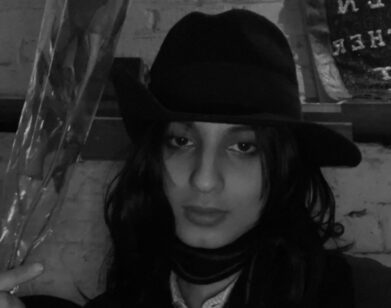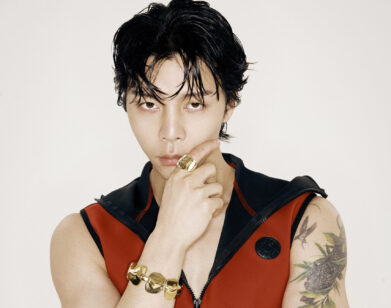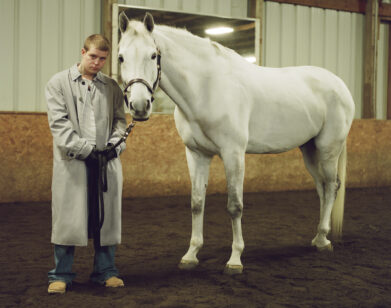Discovery: Tesla Boy

ABOVE: ANTON SEVIDOV.
After three years building a name in Russia, and a few different line-ups, synth-pop trio Tesla Boy is ready to enter the “global” music scene. It is about time they did. Rather alarmingly, we realized that our experience with Russian pop music to-date is limited to the faux-lesbian schoolgirl atrocity of the early 2000s, t.A.T.u., and we are eager to cleanse our palette. You do not, however, need to listen to Tesla Boy as a “Russian” band; it adds a layer of novelty, but it does not make their music. The band produces pure New Wave pop, accessible to anyone who enjoys M83 or the occasional A-ha song. Their newest single, “Fantasy,” sounds like it was plucked from the opening credits of The Breakfast Club.
Here, Interview talks to Tesla Boy’s lead singer Anton Sevidov about the attraction of synth music, the history of Russian pop, and Sevidov’s privileged upbringing.
AGE: 28 (Anton), 27 (Leonid Zatagin), 25 (Mikhail Studnitsyn)
HOMETOWN(S): Minsk, Moscow, and Rostov-upon-Don, Russia
BAND NAME: Does our name come from Nikola Tesla? Yes. My great-great-grandfather was a Serb, and Tesla was also a Serb.
NUBILE NEW WAVE: What attracted me to New Wave music? A condition that is difficult to describe with words. It’s like wild sexuality placed in a very strict and clear structure. It’s as if a beautiful, sexy woman wears a tuxedo and behaves in a very, very restrained way, and only by a few of her gestures can you understand what actually hides behind [her] cool exterior and even coldness.

FIRST SONGS: Do I remember the first song I ever played on the piano? Yes! It was “One Note Samba” by Antonio Carlos Jobim, my father’s friend. My dad taught me; it was the first thing I have learned. The first thing that I played on the synthesizer was the song “Don’t Be Cruel,” it was preloaded. I just needed to push the DEMO button and pretend that I played, it was my first synthesizer, it was a phonogram. I was a trickster and still I am, but now I write and produce tracks myself.
My family belonged to the Soviet sporting elite, thus we could travel abroad, and my family was very fond of music; for them it meant a lot. Although it might seem strange, I grew up in a totally non-Soviet environment; my childhood records were of Stevie Wonder, Prince, James Brown, and David Bowie. My parents often took me to their private parties, where jazzmen jammed! It was at that time [that] I decided I would be a musician. Before I started my music classes, I was very serious [about] tennis for many years.
IF ENGLISH IS THE LANGUAGE OF… I began to learn English at school, and then with a private tutor, who lived in our house. It was easy since I had been listening to English music since childhood. When I write lyrics, I always write them in English, sometimes I even think in English. Sometimes I think that [there are] several Anton’s living inside me and one of them thinks and speaks exclusively in English. I used to write in Russian, but Russian is the language of literature and poetry, not pop music. It is the language of Dostoevsky, but not the language of Ray Charles.
BACK IN THE USSR: Of late, I think I have turned into an expert for the Western media in the issues and analysis of the Russian pop scene. If we mean synth-pop in its broad sense, there are plenty of people who love this kind of music. If we mean New Wave, they are way less. Dance club music is very popular in Russia, but it is rather cheesy music.
The story of pop music in the USSR is quite sad. Throughout the Cold War, it was a hostage and never was free; [pop] music always had to squeeze in rigid limits—but not [dictated by] the market as it was in the United States, but [dictated by] the Soviet propaganda machine.
The USSR lost this competition at large, and in music as well. Lost unconditionally and with a crash. After 1986, [pop] started to make its first steps to join the Soviet underground music wave, but [at that time it] was unable to be digested. The underground music has become the new pop music, same as in the US or Europe. Now we’re reaping the fruits of those lost times. At present our pop music is dull and boring, it is a mixture of trash and self-mockery to make it short—it is terrible!
THE POINT OF MUSIC IS… To give it away, like a magic pill of happiness.
FOR MORE ON TESLA BOY, VISIT THEIR FACEBOOK PAGE.






